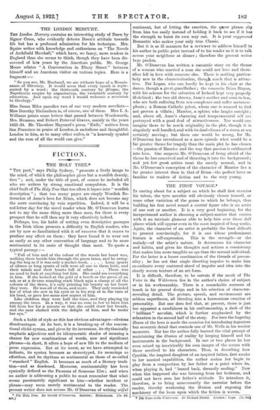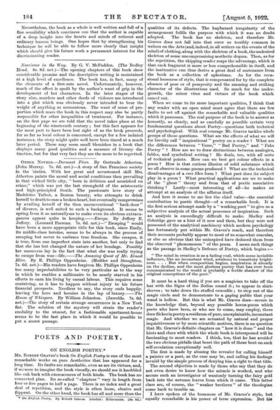THE FIRST VOYAGE.* Ix casting about for a subject on
which he shall first exercise his talent, the tyro novelist will obviously choose himself, or some other variation of the genus to which he belongs, thus building his first novel round a central figure who is an artist of one sort or another. It is a very good beginning, for the inexperienced author is choosing a subject-matter that carries with it an intrinsic glamour able to help him over those dull places which will appear even in the most inspired of long works. Again, the character of an artist is probably the least difficult to present convincingly, for it is one whose predominant feature is self-expression. This is the strength—or the malady—of the artist's nature. It determines his character and habits, and gives his thoughts and actions a consistency that makes him more tangible an ego than the normal individual. For the latter is a looser combination of the threads of person- ality; he has not that single directing impulse to make him co-ordinate every scattered shred of impulse and idea into the closely woven texture of an art form.
It is difficult, therefore, to be certain if the merit of The Voice in the Wild,erness lies in the author's choice of subject or in his workmanship. There is a remarkable sureness of touch in his general design and in his selection of character. revealing detail. The gesture, speech, and environment are seldom superfluous, all blending into a harmonious creation of personality. But one does feel that, at present, there is just too apparent a carefulness in his craftsmanship, a dash of the " brilliant " novelist, which is further emphasized by the relaxation in the second half of the story. For here the lingering illness of the hero is made the occasion for introducing ingenious but eccentric detail that reminds one of Mr. Wells in his weaker moments. Nor has the author fully learned the vital precept of maintaining the illusion of reality by keeping himself and his instruments in the background. In one or two places ho has even mixed up inextricably his own images of the scenes with those ascribed to his characters. Thus, in describing how Cynthia, the inspired daughter of an inspired father, first awoke to her musical capabilities, the author makes her begin to play from a composition by her father at a point where he, when playing it, had "leaned back, dreamily smiling." Now when this happened she was listening from her bedroom, and could not have seen her father's attitude. To introduce it, therefore, is to bring unnecessarily the narrator before the reader, thereby weakening the illusion and exposing the machinery of the loom upon which the fiction is woven.
• The Voice in t& Wilderness. Br Richard Maker. London : Cape. Ps. tid.1 Nevertheless, the book as a whole is well written and full of a fine sensibility which convinces one that the author is capable of a deep insight into tho hearts and minds of reticent and ordinary human beings. One hopes that by strengthening his technique he will be able to follow more closely that insight which should give his future work a permanent interest for the discriminating reader.



































 Previous page
Previous page